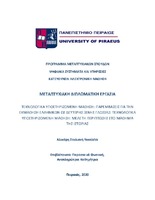Τεχνολογικά υποστηριζόμενη μάθηση: παρεμβάσεις για την εκμάθηση ελληνικών ως δεύτερης ξένης γλώσσας: τεχνολογικά υποστηριζόμενη μάθηση: μελέτη περίπτωσης στο μάθημα της ιστορίας

Προβολή/
Λέξεις κλειδιά
Ηλεκτρονική μάθηση ; Κίνητρα ; Ιστορία ; Inquiry based learning ; Collaborative strategies ; ARCS model ; Effectiveness e-course ; Blended learning ; iPadsΠερίληψη
Η παρούσα ερευνητική διπλωματική εργασία δημιουργήθηκε για να διερευνήσει εάν το συγκεκριμένο e-course που βασίζεται στη διερευνητική μάθηση, αξιοποιεί το μοντέλο κινήτρων ARCS και περιλαμβάνει τεχνικές συνεργατικής μάθησης Brainstorming, Role Playing & Group Investigation συμβάλλει στην ανάπτυξη κινήτρων των μαθητών για την εκμάθηση της ιστορίας και κατ’ επέκταση στην αποτελεσματικότητα του ηλεκτρονικού μαθήματος.
Πιο αναλυτικά, σχεδιάστηκε, υλοποιήθηκε και αξιολογήθηκε ένα μικτό περιβάλλον μάθησης στην ηλεκτρονική πλατφόρμα Google Classroom που περιλαμβάνει συνεργατικές face-to-face και online δραστηριότητες. Βασίζεται στις βασικές συνιστώσες του μοντέλου ανάπτυξης κινήτρων ARCS του Keller (Προσοχή, Σχετικότητα, Εμπιστοσύνη, Ικανοποίηση), αναπτύσσεται σύμφωνα με τις πέντε φάσεις του διερευνητικού μοντέλου μάθησης (Προσανατολισμός, Διαμόρφωση Εννοιών, Έρευνα, Συμπεράσματα, Συζήτηση) και αναφέρεται στον Χρυσό αιώνα του Περικλή, δηλαδή στα κεφάλαια 20-24 του βιβλίου της Δ’ τάξης δημοτικού. Πρόκειται για ένα εικονικό εργαστήριο όπου ο καθηγητής της ιστορίας έχει «κλειδώσει» τους μαθητές και τους έχει μεταφέρει στην Αρχαία Αθήνα του 5ου αιώνα π. Χ. Εκείνοι θα πρέπει να λύσουν όλους τους γρίφους και τις δραστηριότητες, να περάσουν τις δοκιμασίες για να καταφέρουν να δραπετεύσουν.
Το συγκεκριμένο ηλεκτρονικό μάθημα, απευθύνεται σε μαθητές της Δ’ τάξης του δημοτικού σχολείου και σε εκπαιδευτικούς που θέλουν να προσεγγίσουν τη συγκεκριμένη θεματική της ιστορίας με καινοτόμο τρόπο. Προκειμένου οι μαθητές να συμμετάσχουν στο συγκεκριμένο πρόγραμμα, είναι απαραίτητο να διαθέτουν ένα ιστορικό υπόβαθρο (να έχουν διδαχθεί τουλάχιστον τη δεύτερη διδακτική ενότητα του σχολικού εγχειριδίου «Περσικοί πόλεμοι» ώστε να μπορέσουν να κάνουν την ομαλή σύνδεση με τη διδασκόμενη ενότητα) και να είναι εξοικειωμένοι με τη χρήση τεχνολογικών εργαλείων και την περιήγηση σε ηλεκτρονικά περιβάλλοντα μάθησης. Επιπλέον, πρέπει να υπάρχει δυνατότητα σύνδεσης με το Διαδίκτυο, πρόσβασης στις προτεινόμενες ηλεκτρονικές πηγές και εκτύπωσης του διαθέσιμου υλικού.
Το δείγμα της συγκεκριμένης έρευνας αποτελείται από 28 μαθητές της Δ’ τάξης που φοιτούν σε ένα ιδιωτικό σχολείο. Οι συγκεκριμένοι μαθητές είναι εξοικειωμένοι με τη χρήση iPad καθώς διδάσκεται ως αυτόνομο μάθημα ήδη από την Α’ τάξη. Οι συμμετέχοντες είναι 8 αγόρια και 20 κορίτσια, ηλικίας 10-11 ετών. Η εκπαιδευτική παρέμβαση πραγματοποιήθηκε εντός σχολικού ωραρίου και διήρκεσε τρεις εβδομάδες.
Η ερευνητική παρέμβαση βασίστηκε στη ποσοτική ανάλυση των δεδομένων που συλλέχθηκαν πριν, κατά τη διάρκεια και μετά την πειραματική διαδικασία. Τα μέσα συλλογής δεδομένων που χρησιμοποιήθηκαν ήταν:
• ένα ερωτηματολόγιο προετοιμασίας του μαθητή για τη διερεύνηση του υπόβαθρου των μαθητών (όσον αφορά δηλαδή τις γνώσεις, τις δεξιότητες, τα ενδιαφέροντά τους για τις ΤΠΕ καθώς και τον τεχνολογικό εξοπλισμό που έχουν στο σπίτι τους),
• ένα ερωτηματολόγιο IMMS (Instructional Material Motivational Survey pre-test), το οποίο περιείχε 36 ερωτήσεις κλειστού τύπου για τη διερεύνηση των αρχικών κινήτρων των μαθητών για το ηλεκτρονικό μάθημα,
• μία ρουμπρίκα μέτρησης αποτελεσματικότητας του e-course. Η συγκεκριμένη συμπληρωνόταν από τον εκπαιδευτικό μετά το τέλος κάθε ενότητας και αξιολογούσε τον μαθητή με βάση τους πέντε δείκτες της αποτελεσματικότητας του e-course (Engagement, Cooperation, Completion, Grade, Satisfaction) και
• ένα ερωτηματολόγιο IMMS (Instructional Material Motivational Survey post-test) το οποίο περιείχε 36 ερωτήσεις κλειστού τύπου για τη διερεύνηση των τελικών κινήτρων των μαθητών για το ηλεκτρονικό μάθημα
Σύμφωνα με την ανάλυση των αποτελεσμάτων, διαπιστώσαμε ότι το συγκεκριμένο ηλεκτρονικό μάθημα που βασίζεται στο μοντέλο της διερευνητικής μάθησης και στο μοντέλο ανάπτυξης κινήτρων ARCS σημειώνει στατιστικά σημαντική διαφορά στα κίνητρα των εκπαιδευομένων και συμβάλλει στην αποτελεσματικότητά του, σημειώνοντας υψηλές τιμές σε κάθε δείκτη (Engagement, Cooperation, Completion, Grade, Satisfaction).
Η βιβλιογραφική επισκόπηση ανέδειξε την ανάγκη δημιουργίας ενός εννοιολογικού πλαισίου ικανού να αναπτύσσει τα κίνητρα των μαθητών της πρωτοβάθμιας εκπαίδευσης για το μάθημα της ιστορίας. Είναι γενικά αποδεκτό, ότι η μεγαλύτερη αδυναμία του εκπαιδευτικού μας συστήματος είναι ότι οι μαθητές οδηγούνται στη μηχανική απομνημόνευση της διδακτέας ύλης αντί της κριτικής κατανόησης των εννοιών. Ο μαθητής απομνημονεύοντας κάθε λέξη και πρόταση του βιβλίου, στερείται της ιδιολέκτου με αποτέλεσμα να έχει σοβαρό αντίκτυπο στη χρήση της ελληνικής γλώσσας. Αυτό έχει ως αποτέλεσμα οι εκπαιδευόμενοι να λειτουργούν ως παθητικοί δέκτες, να μη δίνουν την απαραίτητη σημασία στα μαθήματα και να μην είναι ικανοί να αντιμετωπίζουν και να επιλύουν τα προβλήματα που συναντούν.
Η κύρια συνεισφορά της παρούσας ερευνητικής διπλωματικής εργασίας έγκειται στην ανάδειξη μιας πιο συστηματικής μελέτης όσον αφορά στον τρόπο διδασκαλίας της ιστορίας αλλά και στην εξοικείωση των μαθητών με την ηλεκτρονική μάθηση. Η δημιουργία του συγκεκριμένου μικτού περιβάλλοντος μάθησης που βασίζεται στη διερευνητική μάθηση, αξιοποιεί το μοντέλο κινήτρων ARCS και περιλαμβάνει τεχνικές συνεργατικής μάθησης Brainstorming, Role Playing & Group Investigation έχει ως στόχο να ενισχύσει τόσο τους συναισθηματικούς (κίνητρα) όσο και τους γνωστικούς παράγοντες μάθησης.


